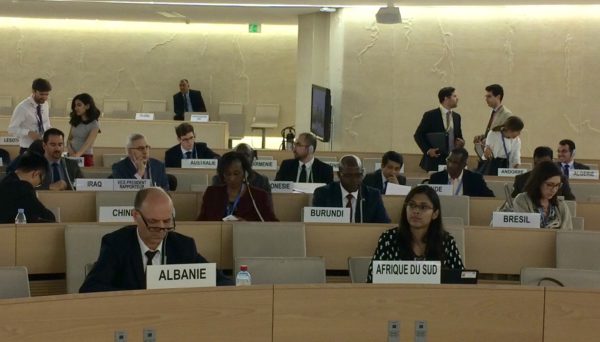The Commission of Inquiry on Burundi presented its report to the Human Rights Council. It talks about ongoing serious crimes.

During the 35th session, an oral report was submitted.
“A deep and widespread sense of fear,” this is evidenced by the testimonies gathered by the Commission of Inquiry on Burundi. During the 35th session, an oral report was submitted. This is a second report because the first one was presented at the March session.
The chairman of the commission, Fatsah Ouguergouz, talks about fear and persecution. He also mentions cases of people who are afraid of testifying for fear of reprisals and those who are reluctant to return home despite repeated calls by the Government. “The scope and gravity of human rights violations and abuses in Burundi since April 2015 have been confirmed,” he said.
Because of the lack of access to Burundi, the commission traveled extensively into the countries of the sub-region. Many Burundians in exile were interviewed. In total, more than 470 testimonies of human rights violations have been gathered since April 2015. And since the end of 2016, these violations have been committed in a more discreet but equally brutal way.
The commission reported extrajudicial executions, torture, sexual and gender-based violence, arbitrary arrests and forced detentions and disappearances, often accompanied by demands for ransoms.
The commission said many of these violations have been committed by members of the National Intelligence Service and Police, sometimes assisted by members of the youth league of the ruling party, the Imbonerakure.
The victims are essentially the opponents of the government in place, including members of FNL and MSD political parties. They are targeted regardless of their ethnicity.
Torture
The description of torture sessions contained in the report is horrible: use of clubs, rifle butts, bayonets, iron bars, metal chains and electric cables with the result that some victims’ bones were broken and other victims lost consciousness; needles stuck into victims’ bodies or unidentified products injected into them; nails ripped out with pliers; burns; and many abuses inflicted on male detainees’ genital organs. “In several cases, acts of torture and ill-treatment were accompanied by violent insults and death threats, including of an ethnic nature”, said Fatsah Ouguergouz.
“Nothing good for Burundi”
No delegation from Burundi was sent to Geneva except its Ambassador dispatched to the scene to represent Burundi. The government said it didn’t expect anything good from this session of the Human Rights Council. “After analyzing the first oral report, we note that this is an extension of the report by the United Nations Independent Investigation on Burundi-UNIIB,” declared the Minister of Human Rights, Martin Nivyabandi, the day before the release by the commission. According to him, the government found it biased and politically oriented. The government has refuted what it describes as untruths contained in these reports and their biased character. This is another reason for Bujumbura to believe that the Thursday’s report was a copy of that of UNIIB. For Bujumbura, the objective is to incriminate by all means the highest authorities of the country.
The government made cutting remarks to the European Union. It accused EU of forcing the establishment of the current Commission of Inquiry contrary to the practices of the Council which favors consensus for the adoption of resolutions on a country. It said the commission of inquiry has no raison d’être. It would not add new elements to the UNIIB report. For the Government, Burundi remains ready to cooperate with anyone for the defense and promotion of human rights “provided that professionalism is de rigueur and that relations respect the sovereignty of the country”. This is essentially the position of Bujumbura.
The Commission of Inquiry on Burundi will present its final report at the 36th session of September 2017. In the meantime, it will continue its investigations. It will decide whether or not some violations constitute crimes under international law.
>>Reactions
Amnesty International: “Total absence of criticism or opposition to the government”
This international organization welcomes the second oral report of the Commission of Inquiry. Amnesty International indicates that the enjoyment of the right to freedom of expression in Burundi has been threatened by the crisis in 2015. “Recent events point out a complete lack of criticism or opposition to the government and its views”
CNIDH: “The security situation has improved significantly”
The Independent National Commission for Human Rights in Burundi(CNIDH) indicates that the security situation has improved significantly despite fear. Jean Baptiste Baribonekeza, Chairman of this commission, demands, however, that the code of criminal procedure should not be reviewed to avoid night searches. He also called for the respect for the national sovereignty.
EU: “Put an end to the current state of impunity.”
The European Union deplored the refusal of Burundian authorities to cooperate with the Commission. “We would like to express our deep concern about the reports on the continuation of numerous human rights violations in Burundi.” The European Union strongly condemns all incitements to violence, particularly those which are linked to sexual violence and based on ethnic criteria, which give the impression of a true “campaign of terror”.
“We call on the government to disarm all illegitimate armed groups and to put an end to the current state of impunity.”
Ambassador of Burundi to Switzerland: “The tendentious and biased nature of the report”
The Burundian envoy to Geneva, Rénovat Tabu, said his government condemned what it called the tendentious and biased nature of the report of the International Commission of Inquiry. He insisted on the sovereignty of the Burundian State. He accused the EU of having “financially paralyzed and tried to pillory the country.”
The United States of America: “Allow the commission of inquiry to do its work”
The United States has asked the Burundian government to allow the commission of inquiry to do its job. It calls for the cessation of killings, torture and other human rights violations.
Tanzania: “inclusive dialogue is the solution”
The representative of Tanzania in the Geneva meeting said the solution to the crisis in Burundi is dialogue. He called for the continuation of inclusive dialogue.



















 IWACU Open Data
IWACU Open Data

